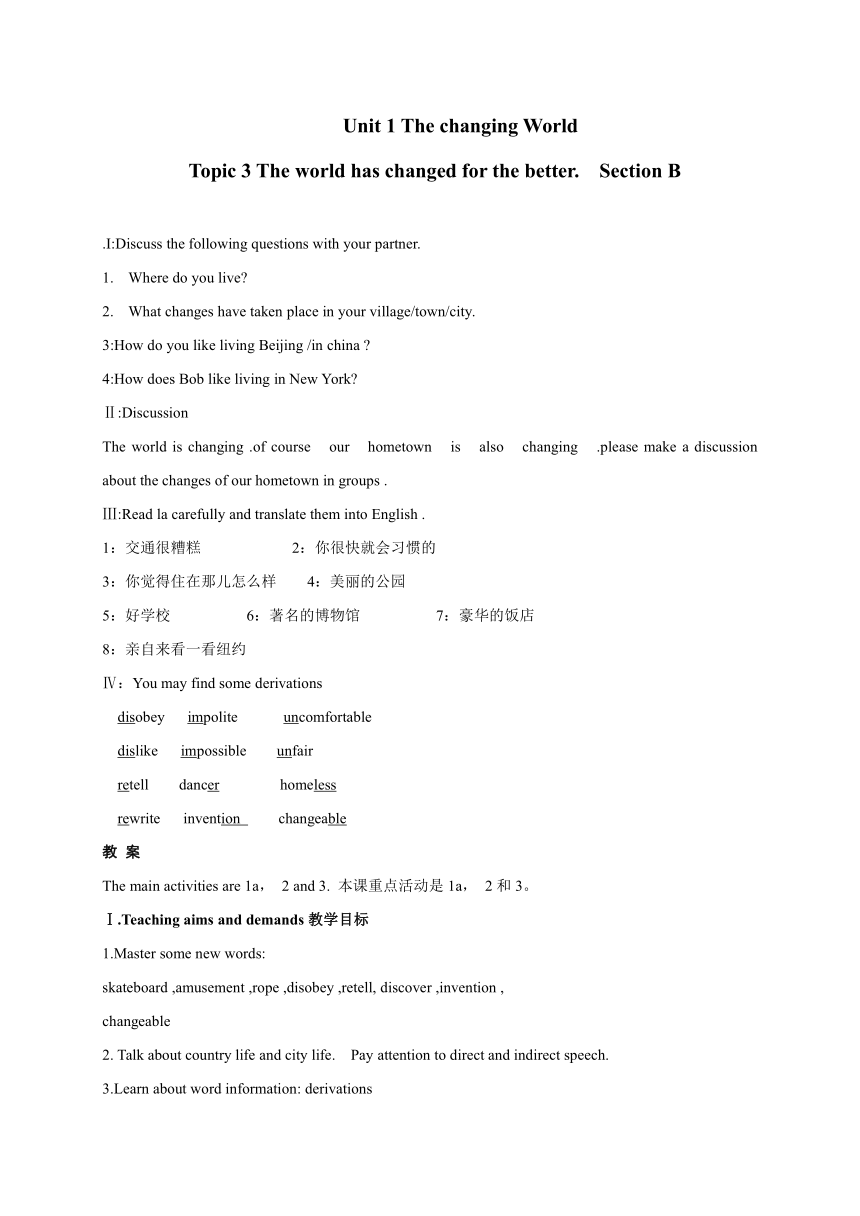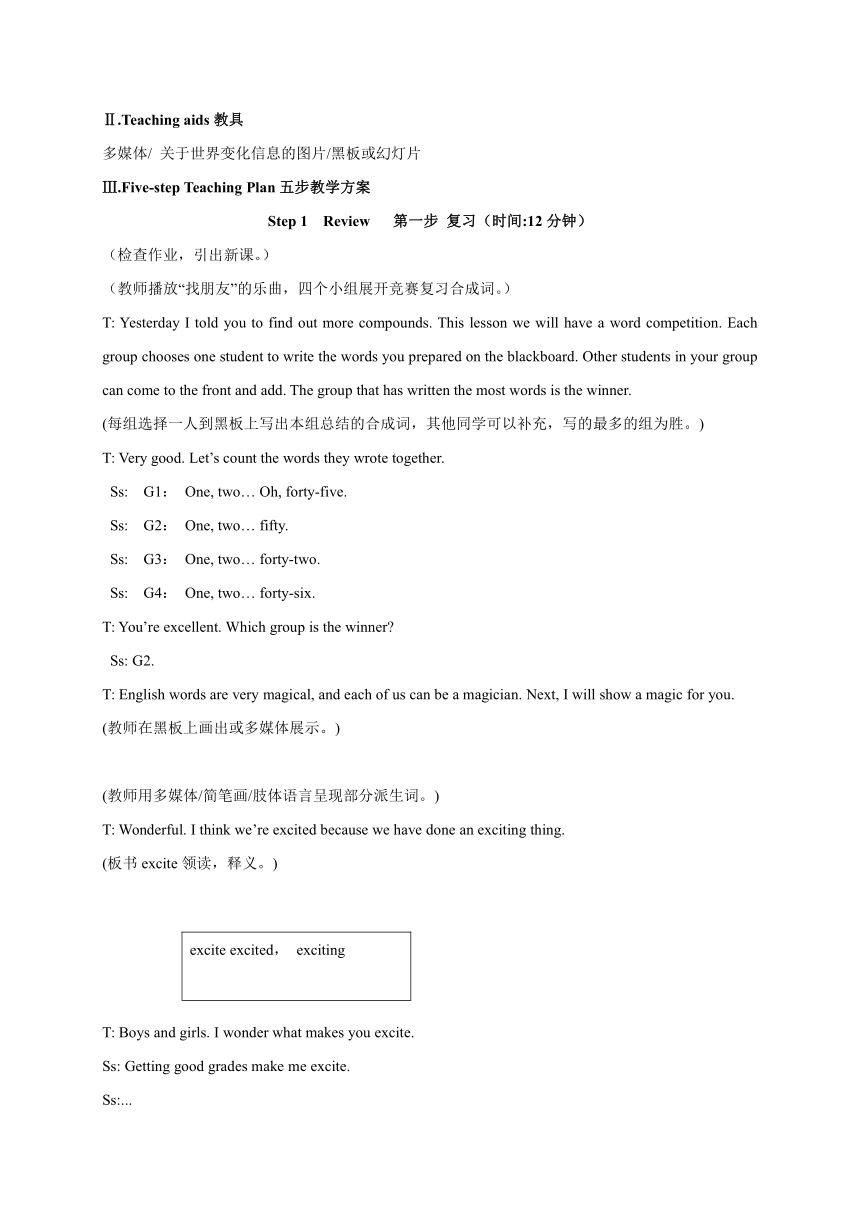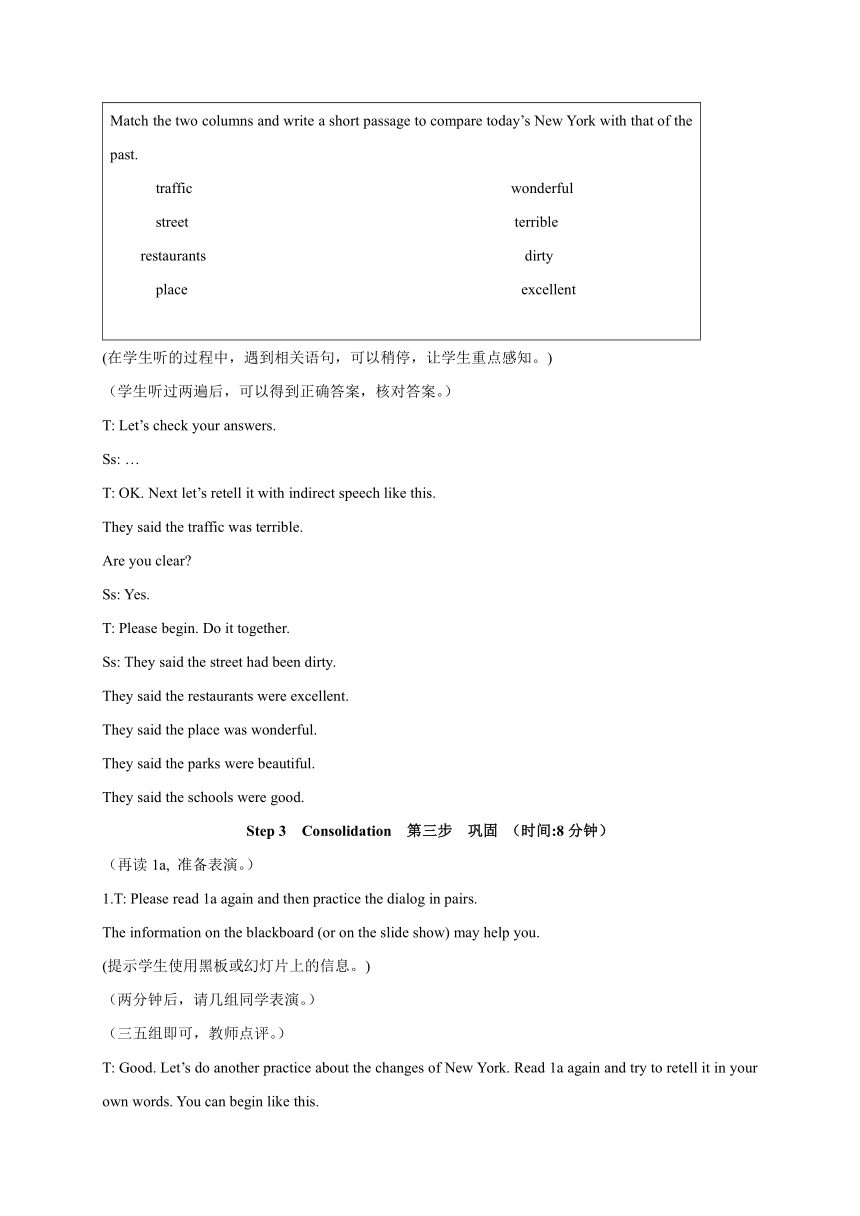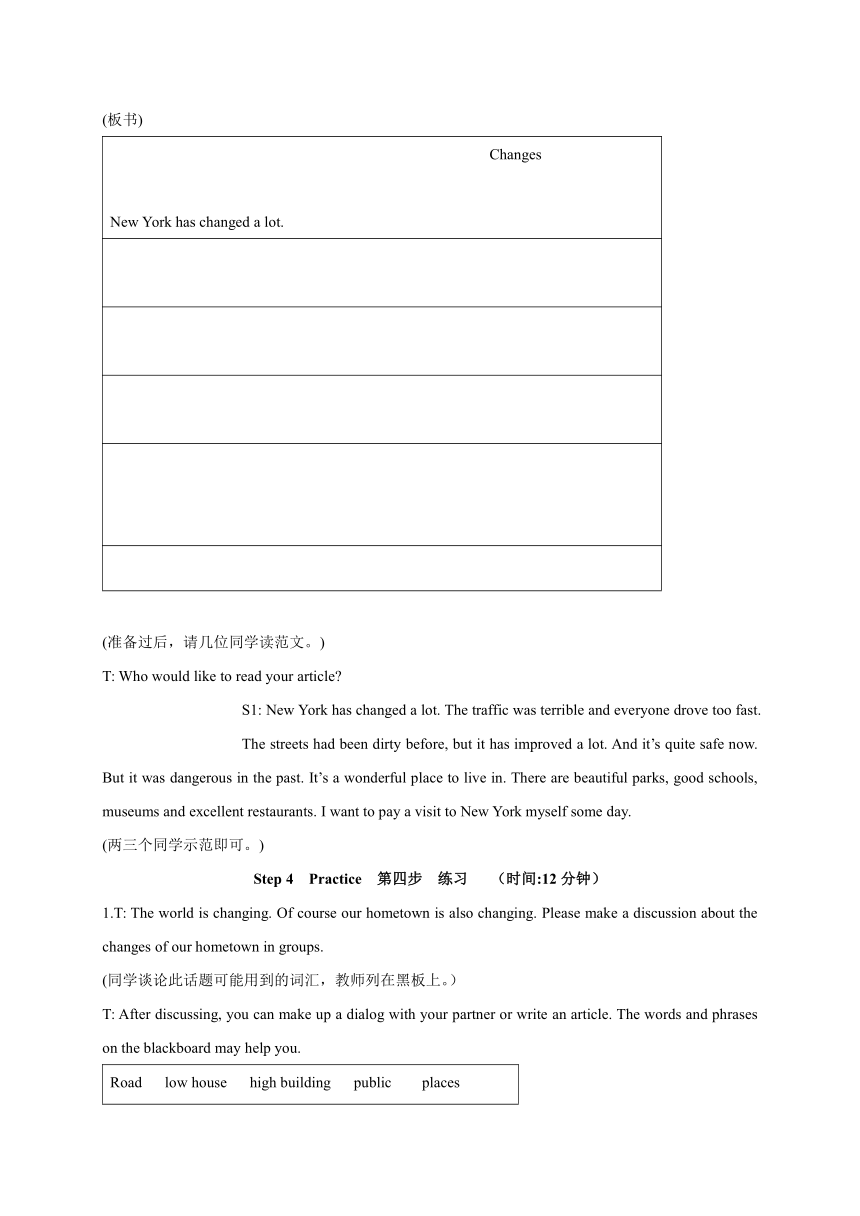Unit 1 Topic 3 The world has changed for the better. Section B 教案+练习(含答案)
文档属性
| 名称 | Unit 1 Topic 3 The world has changed for the better. Section B 教案+练习(含答案) |  | |
| 格式 | doc | ||
| 文件大小 | 73.0KB | ||
| 资源类型 | 教案 | ||
| 版本资源 | 仁爱科普版 | ||
| 科目 | 英语 | ||
| 更新时间 | 2020-11-27 16:24:33 | ||
图片预览





文档简介
Unit 1 The changing World
Topic 3 The world has changed for the better. Section B
.I:Discuss the following questions with your partner.
Where do you live?
What changes have taken place in your village/town/city.
3:How do you like living Beijing /in china ?
4:How does Bob like living in New York?
Ⅱ:Discussion
The world is changing .of course our hometown is also changing .please make a discussion about the changes of our hometown in groups .
Ⅲ:Read la carefully and translate them into English .
1:交通很糟糕 2:你很快就会习惯的
3:你觉得住在那儿怎么样 4:美丽的公园
5:好学校 6:著名的博物馆 7:豪华的饭店
8:亲自来看一看纽约
Ⅳ:You may find some derivations
disobey impolite uncomfortable
dislike impossible unfair
retell dancer homeless
rewrite invention changeable
教 案
The main activities are 1a, 2 and 3. 本课重点活动是1a, 2和3。
Ⅰ.Teaching aims and demands教学目标
1.Master some new words:
skateboard ,amusement ,rope ,disobey ,retell, discover ,invention ,
changeable
2. Talk about country life and city life. Pay attention to direct and indirect speech.
3.Learn about word information: derivations
Ⅱ.Teaching aids教具
多媒体/ 关于世界变化信息的图片/黑板或幻灯片
Ⅲ.Five-step Teaching Plan五步教学方案
Step 1 Review 第一步 复习(时间:12分钟)
(检查作业,引出新课。)
(教师播放“找朋友”的乐曲,四个小组展开竞赛复习合成词。)
T: Yesterday I told you to find out more compounds. This lesson we will have a word competition. Each group chooses one student to write the words you prepared on the blackboard. Other students in your group can come to the front and add. The group that has written the most words is the winner.
(每组选择一人到黑板上写出本组总结的合成词,其他同学可以补充,写的最多的组为胜。)
T: Very good. Let’s count the words they wrote together.
Ss: G1: One, two… Oh, forty-five.
Ss: G2: One, two… fifty.
Ss: G3: One, two… forty-two.
Ss: G4: One, two… forty-six.
T: You’re excellent. Which group is the winner?
Ss: G2.
T: English words are very magical, and each of us can be a magician. Next, I will show a magic for you.
(教师在黑板上画出或多媒体展示。)
(教师用多媒体/简笔画/肢体语言呈现部分派生词。)
T: Wonderful. I think we’re excited because we have done an exciting thing.
(板书excite领读,释义。)
excite excited, exciting
T: Boys and girls. I wonder what makes you excite.
Ss: Getting good grades make me excite.
Ss:...
T: I’m very excited and happy while the world is changing for the better. For example:
Our living conditions get better and better.
The buildings are taller and brighter…
T: Let’s look at the pictures and discuss them.
(教师用多媒体或图片展示几组北京过去和现在的几幅画面,让同学观看讨论北京的变化,然后进行描述。)
(观看讨论两分钟后。)
T: Beijing has changed a lot. Who can describe it?
S1: Beijing has changed a lot. The people’s living conditions are better. The ring roads are wider, but the traffic is busier
S2: The air in Beijing is not fresh and clean enough. There are many kinds of pollution, such as air pollution, water pollution, noise pollution
S3: The Olympic Games will be held in Beijing, so Beijingers try to make it more beautiful and the people will be more friendly.
S4: There are more trees and more beautiful flowers. The people can get the best medical care there.
(教师点评,再请几位同学复述刚才几位同学说的话,目的是复习间接引语。)
T: OK. Who can retell something that the students said just now?
S5: S1 said Beijing had changed a lot…
S6: S2 said the air in Beijing was not fresh…
S7: S3 said…
S8: S4 said…
(同学能复述出其中一二句即可。)
T: Now the world is changing fast, not only cities but also villages. Let’s listen to the tape and know about the changes in New York.
Step 2 Presentation 第二步 呈现 (时间:8分钟)
(听短文,引出下文。)
T: Listen and finish the task.
(教师播放录音同时在小黑板或幻灯片上呈现听力任务。)
Match the two columns and write a short passage to compare today抯 New York with that of the past.
(在学生听的过程中,遇到相关语句,可以稍停,让学生重点感知。)
(学生听过两遍后,可以得到正确答案,核对答案。)
T: Let’s check your answers.
Ss: …
T: OK. Next let’s retell it with indirect speech like this.
They said the traffic was terrible.
Are you clear?
Ss: Yes.
T: Please begin. Do it together.
Ss: They said the street had been dirty.
They said the restaurants were excellent.
They said the place was wonderful.
They said the parks were beautiful.
They said the schools were good.
Step 3 Consolidation 第三步 巩固 (时间:8分钟)
(再读1a, 准备表演。)
1.T: Please read 1a again and then practice the dialog in pairs.
The information on the blackboard (or on the slide show) may help you.
(提示学生使用黑板或幻灯片上的信息。)
(两分钟后,请几组同学表演。)
(三五组即可,教师点评。)
T: Good. Let’s do another practice about the changes of New York. Read 1a again and try to retell it in your own words. You can begin like this.
(板书)
traffic wonderful
street terrible
restaurants dirty
place excellent
Changes
New York has changed a lot.
(准备过后,请几位同学读范文。)
T: Who would like to read your article?
S1: New York has changed a lot. The traffic was terrible and everyone drove too fast. The streets had been dirty before, but it has improved a lot. And it抯 quite safe now. But it was dangerous in the past. It抯 a wonderful place to live in. There are beautiful parks, good schools, museums and excellent restaurants. I want to pay a visit to New York myself some day.
(两三个同学示范即可。)
Step 4 Practice 第四步 练习 (时间:12分钟)
1.T: The world is changing. Of course our hometown is also changing. Please make a discussion about the changes of our hometown in groups.
(同学谈论此话题可能用到的词汇,教师列在黑板上。)
T: After discussing, you can make up a dialog with your partner or write an article. The words and phrases on the blackboard may help you.
Road low house high building public places wonderful clean wide comfortable peaceful
(学生准备后,请几位同学做示范。)
T: Who would like to make up a dialog with your partner?
Oh, S1, S2 please.
S1: We have lived in this town for long. It has changed a lot, hasn't it? How do you like living here?
S2: Yes, it has changed a lot. It抯 great. I like it.
S1: The road used to be narrow and dirty.
S2: But it is wider and cleaner.
S1: You抮e right. There used to be low houses.
S2:...
(学生对自己的家乡很熟悉,自然有很多话要说。)
(提问两三组即可。)
(请一二位同学自述家乡变化。)
T: Good job. Now who can talk about it alone? S3, Please.
S3: I’d love to. My hometown has changed a lot. My grandma said there were no parks; no schools and their living conditions were very bad when she was young. But now…
T: Oh, there are many differences between the present and the past. In our class, some students live here, but some come from the village. Please communicate with each other and discuss it. What’s the life like in the life and what’s the city like in the village? What’s the difference between them? The pictures may help you.
(教师出示几幅图片, 可张贴在黑板上也可直接利用书中20页的四幅图片。)
(讨论过后,请几位同学表达一下自己的观点。)
(教师提问,引起下文。)
T: There are so many differences between the village life and the city life. I want to know who’d like to live in the village. Hands up.
(一部分同学举手,教师选择一两位同学了解原因。)
T: Why would you like to live in the village?
S4: Because the air there is fresher and cleaner…
S5: There are more trees and it’s very peaceful.
T: Who’d like to live in the city? Hands up.
(一部分同学举手。)
T: The reason?
S6: It’s modern. There are lots of tall buildings, beautiful parks…
S7: ….
2.(为了增加大家的词汇量,提高口语表达及书面表达能力,做一个单词游戏扩大同学们的词汇量。)
T: In order to improve our oral and writing skills we must master a lot of words. There are some skills to help remember more words. Let’s play another word game. Please help the following words wear “hats” or “shoes”. Then the word will change into another one.
(教师在黑板上呈现单词,请同学加前缀或后缀变成新词。)
Obey able hope eleven beauty Write agree humor fog danger
friendly recent ill health bore
luck tell like possible comfortable
polite success suggest use visit
west win your noise snow
rapid happy develop labor peace
home excite change bright build
care collect crowd enjoy twenty
T: Now, I’ll divide you into five groups. Each group chooses one student to come to the front and change the words on the blackboard. Other students can help him.
(学生很快完成。答案略。)
T: Very good. Some words don’t have only one hat or a pair of shoes.
For example: use-useful-useless-reuse write-writer-rewrite
Ss: The words are very interesting.
T: Yes. In this way, you can memorize many words in a short time.
(学生意犹未尽,乘机布置一项课后作业。)
Step 5 Project 第五步 综合探究活动 (时间:5分钟)
T: If you are interested in it, please collect and sum up the words like these after class. Next let’s have a discussion and try to use the words in the game. Such as: like/dislike, comfortable/uncomfortable…
(老师板书讨论问题。)
1.Where do you live?
2.What changes have taken place in your village/town/city?
3.How do you like living there? Why?
4.If you don’t want to live there, where do you want to live?
(学生讨论一会儿。)
T: Who can show your opinions?
S1: I like living in the village, and I dislike living in the city. I think the village is not noisy, but in the city there is a lot of noise, so the life in the city is uncomfortable…
S2:…
S3:…
T: Stop here. Excellent. Please report it next class.
板 书
Useful expressions
1:How do you like (doing )sth
What do you think of……?
2:get used to (doing)sth
used to do sth
be used to do sth
3:to live in
4:must
5:has changed a lot
Group work
Example
Maria/kangkang ……said/told me
My grandparents said /told me
1:ride a skateboard
2:go to an amusement park
3:see a film in the open air
4:jump rope
5:play tug of war
6:play hide -and -seek
练习题
Ⅰ:根据首字母提示或所给汉语完成句子。
1:He m___ to do his work well with very little help .
2: She has to p___ food and clothes for her family.
3: My neighbor _____(楼下的) is a singer.
4: Please_____(复述) this passage in your own words.
Ⅱ: 单项选择
( )1:China has been successful _____ the WTO.
A:to enter B:entered C:in enter D:in entering
( ) 2:He asked me _____.
A: What she was doing B:what was she doing
C: she was doing what D:was she doing what
( ) 3:Mr Black _____100 yan _____his ____his watch .
A: paid ,for B:spent , in
C: took ,to D:cost ,for
( ) 4:I_____up late ,but mow I____up ealy.
A: use to get , get used to get
B: used to get , used to getting
C: used to get ,get used to get
D: used to get ,get used to getting
( )5:He want to know________________.
A: What does her mother like
B: What is her mother like
C: What her mother is like
D: What her mother like
( )6:If there are many people on the earth ,we won’t have enough room
to ______.
A: like B: like on C: likes D: like in
( )7:___the development of china the young_____a lot of chances to succeed .
A: under , has B: without have
C: with , have D: under, have
( )8:Many’s father wants to _____his son _____the best education in the country.
A: provide B: give ,with
C: send ,to D: provide ,to
习题答案Ⅰ: 1、managed 2、 provide 3、 downstairs 4、 retell 5、 discovered
Ⅱ: D A A D C D C A
Topic 3 The world has changed for the better. Section B
.I:Discuss the following questions with your partner.
Where do you live?
What changes have taken place in your village/town/city.
3:How do you like living Beijing /in china ?
4:How does Bob like living in New York?
Ⅱ:Discussion
The world is changing .of course our hometown is also changing .please make a discussion about the changes of our hometown in groups .
Ⅲ:Read la carefully and translate them into English .
1:交通很糟糕 2:你很快就会习惯的
3:你觉得住在那儿怎么样 4:美丽的公园
5:好学校 6:著名的博物馆 7:豪华的饭店
8:亲自来看一看纽约
Ⅳ:You may find some derivations
disobey impolite uncomfortable
dislike impossible unfair
retell dancer homeless
rewrite invention changeable
教 案
The main activities are 1a, 2 and 3. 本课重点活动是1a, 2和3。
Ⅰ.Teaching aims and demands教学目标
1.Master some new words:
skateboard ,amusement ,rope ,disobey ,retell, discover ,invention ,
changeable
2. Talk about country life and city life. Pay attention to direct and indirect speech.
3.Learn about word information: derivations
Ⅱ.Teaching aids教具
多媒体/ 关于世界变化信息的图片/黑板或幻灯片
Ⅲ.Five-step Teaching Plan五步教学方案
Step 1 Review 第一步 复习(时间:12分钟)
(检查作业,引出新课。)
(教师播放“找朋友”的乐曲,四个小组展开竞赛复习合成词。)
T: Yesterday I told you to find out more compounds. This lesson we will have a word competition. Each group chooses one student to write the words you prepared on the blackboard. Other students in your group can come to the front and add. The group that has written the most words is the winner.
(每组选择一人到黑板上写出本组总结的合成词,其他同学可以补充,写的最多的组为胜。)
T: Very good. Let’s count the words they wrote together.
Ss: G1: One, two… Oh, forty-five.
Ss: G2: One, two… fifty.
Ss: G3: One, two… forty-two.
Ss: G4: One, two… forty-six.
T: You’re excellent. Which group is the winner?
Ss: G2.
T: English words are very magical, and each of us can be a magician. Next, I will show a magic for you.
(教师在黑板上画出或多媒体展示。)
(教师用多媒体/简笔画/肢体语言呈现部分派生词。)
T: Wonderful. I think we’re excited because we have done an exciting thing.
(板书excite领读,释义。)
excite excited, exciting
T: Boys and girls. I wonder what makes you excite.
Ss: Getting good grades make me excite.
Ss:...
T: I’m very excited and happy while the world is changing for the better. For example:
Our living conditions get better and better.
The buildings are taller and brighter…
T: Let’s look at the pictures and discuss them.
(教师用多媒体或图片展示几组北京过去和现在的几幅画面,让同学观看讨论北京的变化,然后进行描述。)
(观看讨论两分钟后。)
T: Beijing has changed a lot. Who can describe it?
S1: Beijing has changed a lot. The people’s living conditions are better. The ring roads are wider, but the traffic is busier
S2: The air in Beijing is not fresh and clean enough. There are many kinds of pollution, such as air pollution, water pollution, noise pollution
S3: The Olympic Games will be held in Beijing, so Beijingers try to make it more beautiful and the people will be more friendly.
S4: There are more trees and more beautiful flowers. The people can get the best medical care there.
(教师点评,再请几位同学复述刚才几位同学说的话,目的是复习间接引语。)
T: OK. Who can retell something that the students said just now?
S5: S1 said Beijing had changed a lot…
S6: S2 said the air in Beijing was not fresh…
S7: S3 said…
S8: S4 said…
(同学能复述出其中一二句即可。)
T: Now the world is changing fast, not only cities but also villages. Let’s listen to the tape and know about the changes in New York.
Step 2 Presentation 第二步 呈现 (时间:8分钟)
(听短文,引出下文。)
T: Listen and finish the task.
(教师播放录音同时在小黑板或幻灯片上呈现听力任务。)
Match the two columns and write a short passage to compare today抯 New York with that of the past.
(在学生听的过程中,遇到相关语句,可以稍停,让学生重点感知。)
(学生听过两遍后,可以得到正确答案,核对答案。)
T: Let’s check your answers.
Ss: …
T: OK. Next let’s retell it with indirect speech like this.
They said the traffic was terrible.
Are you clear?
Ss: Yes.
T: Please begin. Do it together.
Ss: They said the street had been dirty.
They said the restaurants were excellent.
They said the place was wonderful.
They said the parks were beautiful.
They said the schools were good.
Step 3 Consolidation 第三步 巩固 (时间:8分钟)
(再读1a, 准备表演。)
1.T: Please read 1a again and then practice the dialog in pairs.
The information on the blackboard (or on the slide show) may help you.
(提示学生使用黑板或幻灯片上的信息。)
(两分钟后,请几组同学表演。)
(三五组即可,教师点评。)
T: Good. Let’s do another practice about the changes of New York. Read 1a again and try to retell it in your own words. You can begin like this.
(板书)
traffic wonderful
street terrible
restaurants dirty
place excellent
Changes
New York has changed a lot.
(准备过后,请几位同学读范文。)
T: Who would like to read your article?
S1: New York has changed a lot. The traffic was terrible and everyone drove too fast. The streets had been dirty before, but it has improved a lot. And it抯 quite safe now. But it was dangerous in the past. It抯 a wonderful place to live in. There are beautiful parks, good schools, museums and excellent restaurants. I want to pay a visit to New York myself some day.
(两三个同学示范即可。)
Step 4 Practice 第四步 练习 (时间:12分钟)
1.T: The world is changing. Of course our hometown is also changing. Please make a discussion about the changes of our hometown in groups.
(同学谈论此话题可能用到的词汇,教师列在黑板上。)
T: After discussing, you can make up a dialog with your partner or write an article. The words and phrases on the blackboard may help you.
Road low house high building public places wonderful clean wide comfortable peaceful
(学生准备后,请几位同学做示范。)
T: Who would like to make up a dialog with your partner?
Oh, S1, S2 please.
S1: We have lived in this town for long. It has changed a lot, hasn't it? How do you like living here?
S2: Yes, it has changed a lot. It抯 great. I like it.
S1: The road used to be narrow and dirty.
S2: But it is wider and cleaner.
S1: You抮e right. There used to be low houses.
S2:...
(学生对自己的家乡很熟悉,自然有很多话要说。)
(提问两三组即可。)
(请一二位同学自述家乡变化。)
T: Good job. Now who can talk about it alone? S3, Please.
S3: I’d love to. My hometown has changed a lot. My grandma said there were no parks; no schools and their living conditions were very bad when she was young. But now…
T: Oh, there are many differences between the present and the past. In our class, some students live here, but some come from the village. Please communicate with each other and discuss it. What’s the life like in the life and what’s the city like in the village? What’s the difference between them? The pictures may help you.
(教师出示几幅图片, 可张贴在黑板上也可直接利用书中20页的四幅图片。)
(讨论过后,请几位同学表达一下自己的观点。)
(教师提问,引起下文。)
T: There are so many differences between the village life and the city life. I want to know who’d like to live in the village. Hands up.
(一部分同学举手,教师选择一两位同学了解原因。)
T: Why would you like to live in the village?
S4: Because the air there is fresher and cleaner…
S5: There are more trees and it’s very peaceful.
T: Who’d like to live in the city? Hands up.
(一部分同学举手。)
T: The reason?
S6: It’s modern. There are lots of tall buildings, beautiful parks…
S7: ….
2.(为了增加大家的词汇量,提高口语表达及书面表达能力,做一个单词游戏扩大同学们的词汇量。)
T: In order to improve our oral and writing skills we must master a lot of words. There are some skills to help remember more words. Let’s play another word game. Please help the following words wear “hats” or “shoes”. Then the word will change into another one.
(教师在黑板上呈现单词,请同学加前缀或后缀变成新词。)
Obey able hope eleven beauty Write agree humor fog danger
friendly recent ill health bore
luck tell like possible comfortable
polite success suggest use visit
west win your noise snow
rapid happy develop labor peace
home excite change bright build
care collect crowd enjoy twenty
T: Now, I’ll divide you into five groups. Each group chooses one student to come to the front and change the words on the blackboard. Other students can help him.
(学生很快完成。答案略。)
T: Very good. Some words don’t have only one hat or a pair of shoes.
For example: use-useful-useless-reuse write-writer-rewrite
Ss: The words are very interesting.
T: Yes. In this way, you can memorize many words in a short time.
(学生意犹未尽,乘机布置一项课后作业。)
Step 5 Project 第五步 综合探究活动 (时间:5分钟)
T: If you are interested in it, please collect and sum up the words like these after class. Next let’s have a discussion and try to use the words in the game. Such as: like/dislike, comfortable/uncomfortable…
(老师板书讨论问题。)
1.Where do you live?
2.What changes have taken place in your village/town/city?
3.How do you like living there? Why?
4.If you don’t want to live there, where do you want to live?
(学生讨论一会儿。)
T: Who can show your opinions?
S1: I like living in the village, and I dislike living in the city. I think the village is not noisy, but in the city there is a lot of noise, so the life in the city is uncomfortable…
S2:…
S3:…
T: Stop here. Excellent. Please report it next class.
板 书
Useful expressions
1:How do you like (doing )sth
What do you think of……?
2:get used to (doing)sth
used to do sth
be used to do sth
3:to live in
4:must
5:has changed a lot
Group work
Example
Maria/kangkang ……said/told me
My grandparents said /told me
1:ride a skateboard
2:go to an amusement park
3:see a film in the open air
4:jump rope
5:play tug of war
6:play hide -and -seek
练习题
Ⅰ:根据首字母提示或所给汉语完成句子。
1:He m___ to do his work well with very little help .
2: She has to p___ food and clothes for her family.
3: My neighbor _____(楼下的) is a singer.
4: Please_____(复述) this passage in your own words.
Ⅱ: 单项选择
( )1:China has been successful _____ the WTO.
A:to enter B:entered C:in enter D:in entering
( ) 2:He asked me _____.
A: What she was doing B:what was she doing
C: she was doing what D:was she doing what
( ) 3:Mr Black _____100 yan _____his ____his watch .
A: paid ,for B:spent , in
C: took ,to D:cost ,for
( ) 4:I_____up late ,but mow I____up ealy.
A: use to get , get used to get
B: used to get , used to getting
C: used to get ,get used to get
D: used to get ,get used to getting
( )5:He want to know________________.
A: What does her mother like
B: What is her mother like
C: What her mother is like
D: What her mother like
( )6:If there are many people on the earth ,we won’t have enough room
to ______.
A: like B: like on C: likes D: like in
( )7:___the development of china the young_____a lot of chances to succeed .
A: under , has B: without have
C: with , have D: under, have
( )8:Many’s father wants to _____his son _____the best education in the country.
A: provide B: give ,with
C: send ,to D: provide ,to
习题答案Ⅰ: 1、managed 2、 provide 3、 downstairs 4、 retell 5、 discovered
Ⅱ: D A A D C D C A
同课章节目录
- Unit 1 The Changing World
- Topic 1 Our country has developed rapidly.
- Topic 2 The population in developing countries is
- Topic 3 The world has changed for the better.
- Unit 2 Saving the earth.
- Topic 1 Pollution has causes too many problems.
- Topic 2 All these problems are very serious.
- Topic 3 What can we do to protect the environment
- Unit 3 English around the World
- Topic 1 English is widely spoken around the world.
- Topic 2 Some things usually have different meaning
- Topic 3 Could you give us some advice on how to l
- Unit 4 Amazing Science
- Topic 1 When was it invented?
- Topic 2 I'm excited about the things that will be
- Topic 3 China is the third nation that sent a pers
